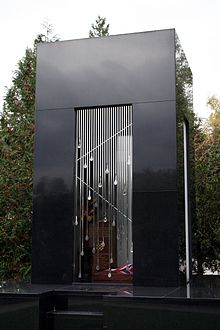Bruno Bušić
This article needs additional citations for verification. (April 2010) |
Ante Bruno Bušić (6 October 1939 – 16 October 1978) was a Croatian writer and critic of Yugoslav communism. He was one of the best-known victims of UDBA (Yugoslav secret police) killing.[1]
Biography
Bušić was born in the village of Vinjani Donji near Imotski. By the time he enrolled onto high school in Imotski, he was already involved in activities which communist authorities considered rebellious. In 1957 he joined a group called Tiho (silently, lit. - quietly) whose aim was to "fight for freedom, equality and the formation of a free Croatia based on democratic principles". It was at that time that the UDBA (Yugoslav secret police) began watching him. Bušić, along with his schoolmates who had also participated in Tiho, were expelled from school soon after.
Two years later, the expelled students were allowed to return to school. Bušić went on to enroll in University of Zagreb and earned an economics degree in 1964. In 1965 he got a job at the "Institute for the History of Croatia's Workers' Movement" (Institut za povijest radničkoga pokreta Hrvatske) which was run by former Yugoslav general and future Croatian president Franjo Tuđman. In 1966 he was sentenced to jail for his political views, but by this time he had escaped to Austria. At the behest of Tuđman who still had great influence in Yugoslavia, Bušić returned to Zagreb and was not sent to jail. In 1967 he resumed work at the Institute.
In 1969 Bušić moved on to write for the "Croatian Literary Paper" (Hrvatski književni list). Here he confronted several issues considered controversial by Yugoslav officials. The paper was eventually banned. This led Bušić to emigrate to Paris for a period of time where he attended the Sorbonne. Upon his return in 1971, he became one of directors of the "Croatian Weekly" (Hrvatski tjednik). That same year the Yugoslav government issued a crack-down on what had been called Hrvatsko proljeće (Croatian Spring). Bušić was among those arrested and he was in jail until 1973.
He left Yugoslavia for the last time in 1975. He spent most of his time living in England, but travelled extensively through the rest of Europe. He wrote for "New Croatia" (Nova Hrvatska) during this period.
He was killed in Paris, France in 1978 by an agent of UDBA, the Yugoslav secret police.[1]

Exactly 21 years after his death, with Croatian independence gained, his remains were moved from Paris to the Mirogoj cemetery in Zagreb and were laid to rest next to the dead of the Croatian War of Independence.
Vinko Sindičić, former agent of UDBA was prosecuted for the murder of Bušić. He was found not guilty in 2000.[2] On 6 June 2005 Supreme Court of Croatia has verified that verdict.[3]
References
- ^ a b Schindler, John (4 February 2010), Doctor of Espionage: The Victims of UDBA, Sarajevo: Slobodna Bosna, pp. 35–38
- ^ http://www.hrt.hr/arhiv/2000/03/23/HRT0018.html
- ^ http://novine.novilist.hr/default.asp?WCI=Rubrike&WCU=285928592863285E2863285A28582858285D286328962897289E286328632859285C285E285A285928602863286328632863M
- Use dmy dates from June 2013
- 1939 births
- 1978 deaths
- Murder in 1978
- Croatian journalists
- Assassinated Croatian people
- Croatian people murdered abroad
- People murdered in France
- People from Imotski
- Faculty of Economics and Business, University of Zagreb alumni
- University of Paris alumni
- Croatian dissidents
- Burials at Mirogoj Cemetery
- Order of Ante Starčević recipients
- Yugoslav dissidents
- Extrajudicial killings
- Assassinated Yugoslav people
